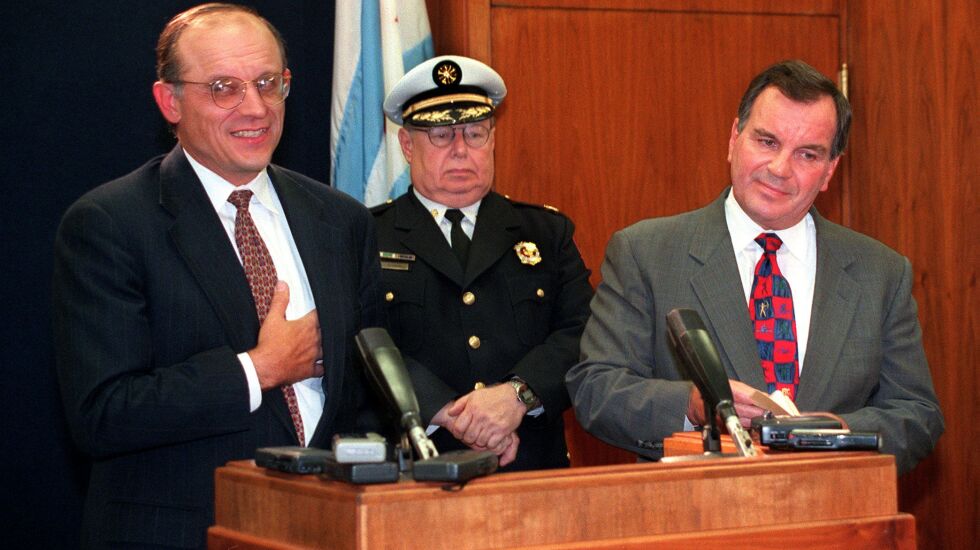As the city’s longtime chief labor negotiator, attorney Jim Franczek worked for and survived four Chicago mayors: Jane Byrne, Harold Washington, Richard M. Daley and Rahm Emanuel. He couldn’t survive the fifth mayor: Lori Lightfoot.
Sources said a vacationing Lightfoot called Franczek on Monday and summarily fired him for doing a lengthy interview on a Chicago Sun-Times podcast where he essentially endorsed Paul Vallas over Brandon Johnson in the April 4 mayoral runoff.
Franczek refused to comment on Lightfoot’s decision to fire him. The mayor’s office said: “We do not comment on attorney-client relationships.”
It was not known what about the Sun-Times interview angered Lightfoot to the point where she would abruptly end a relationship between Franczek and the city that has lasted nearly 40 years and delivered countless contracts between the city and its police officers, firefighters, public school teachers and building trade unions.
During the interview, Franczek portrayed Vallas as the “clear choice” for mayor of Chicago and expressed grave concerns about Johnson’s role as a paid organizer for the CTU.
Franczek sat on the other side of the bargaining table when Vallas was serving as an unpaid adviser to the FOP who helped deliver the eight-year contract that ended the longest labor stalemate in Chicago history.
If not for Vallas’ powers of persuasion, Franczek claimed that contract would never have included all of the “core police accountability provisions” demanded by City Council members and the consent decree outlining terms of federal court oversight of the Chicago Police Department.
Before being eliminated in round one of the mayoral election, Lightfoot accused Vallas of taking his law-and-order “marching orders” from her longtime nemesis: newly reelected FOP President John Catanzara.
In the Sun-Times interview, Franczek said it was a “complete mischaracterization to say that Paul Vallas, who is not exactly a wallflower himself, was taking orders from John Catanzara.”
Franczek described Vallas as a “dealmaker” who “makes things work.” He pointed to a pair of four-year teachers contracts that he and Vallas negotiated together during Vallas’ six-year run as CEO of the Chicago Public Schools from 1995 to 2001.
“Prior to that — from 1968 to 1995 — there were 11 strikes. There were 20 collective bargaining agreements that were one year or two years. The Chicago Public Schools were literally in a state of uncertainty and fragility,” Franczek said.
“Paul came in, and for eight years with two four-year collective bargaining agreements, provided stability, flexibility and predictability to the system. And it wasn’t as if the Chicago Teachers Union [leaders] were a bunch of pansies back then,” Franczek said.
After receiving $5 million in campaign contributions from the CTU and millions more from SEIU Locals 1 and 73 and SEIU Healthcare, Franczek said he finds it “inconceivable, given human nature, that he’s not gonna feel beholden and an obligation” to both unions.
“He said, ‘I’m gonna resign from the Chicago Teachers Union.’ That’s fine. But he’s worked his professional career for the Chicago Teachers Union. And I can’t believe that he’s still not gonna bleed CTU,” he said.

Franczek was asked whether a “personality conflict” between Lightfoot and CTU President Stacy Davis Gates was behind the long, bitter battle between the mayor and the CTU. The two sides have spent four years at loggerheads, including an 11-day strike in 2019 and two job actions during the pandemic.
“The Chicago Teachers Union has evolved and changed a lot over the years,” Franczek said.
The 2019 contract involved “not just your meat and potatoes issues [of] money and benefits, but also issues that were much more important,” said Franczek. “Hiring social workers. Hiring nurses. We negotiated the homeless. You had the convergence of a union that felt very, very strongly about certain issues vs. accommodating that with a process that heretofore had not accommodated those kinds of issues.”
“You also had some very strong leadership. Stacy Davis Gates is a formidable person. She’s extremely bright. She’s extremely committed. And so is Mayor Lightfoot. You sort of had those kinds of things coming together,” said Franczek.
The interview closed with Franczek being asked to identify the mayor who was the easiest to deal with and the mayor whom he viewed as the most difficult.
“Oh my Lord in heaven. That is an impossible question to answer,” he said. “You could not characterize Daley or Emanuel or Lightfoot as easy. If you said who was the most difficult and the hardest to work for, you’ve still got the same problem. They all have their challenges.”







